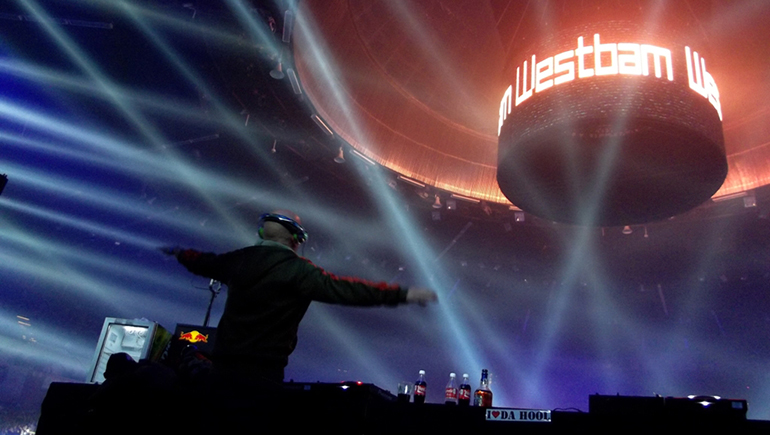Only a few days left, until the third edition of our series "Hybrid Encounters" takes place on October 18th. Brought together for a dialogue are the renowned literature scientist Hans Ulrich Gumbrecht and the equally popular DJ Maximilian Lenz aka Westbam. For those unfamiliar with the latter, here is an attempt of an introduction together with some thoughts on why a conversation between these two should be an interesting one!
A scientist for literature and a techno DJ have more in common than one might think. Both are firmly situated within popular culture. If literatures' history really starts in with the invention of the rotary printing press, techno is made possible by discs that rotate on a turntable. Within such technologies of mass (re)production, the key to successful distribution is a sense for seriality. Producing series and operating in continuities is the ideal already embedded within the technological systems. The printing press prints on a continually rotating cylinder, the long-playing vinyl record continually turns in the same speed in order to produce a stream of connected sounds. Underneath the (re)production of such different content as slow dance music or fast beats, powerful political pamphlets or long historical studies lies a tireless movement. Within mass culture then, consequently it is an ideal to act in a way, not to interrupt this continuity that machines so perfectly employ. Not only technicians are needed for the task of maintaining the process. It becomes part of the arts, reproduced this way, to serve the structures of reproduction. Pictures produced to be photographed and reproduced in catalogues, fiction, written in serial form and published as continuing storyline in feuilletons or music, composed by semi-automatic techniques – or live composed by sampling, cutting, fading and scratching.
Mass phenomena are often described as hype or fashion, rather pathologically also as craze or mania – they seem to be what they are simply because they are new, the newest addition in a potentially endless series of newness. Westbam was the first German DJ at the DMC World Championship in 1987, he was among the first DJs in Germany who made a name for themselves with extravagant scratching techniques. He was new. And with him came to popularity the musical style of techno, before developed in the clubs of Detroit and London and enjoyed under chemically enhanced perception. Westbam quickly founded several labels as well as the popular Mayday festival. He participated within the Love parade festival and published reflections on how practices within the subculture could inform a wider society under the title "raving society". The list of artists he cooperated with is long and diverse. It spans over a variety of music styles from D.A.F. singer Gabi Delgado-López and his punk-inspired electronic body music and Nena, one of the central figures of the "Neue Deutsche Welle" all the way to American superstars like Iggy Pop, Lil Wayne or Kanye West. Today, techno is everywhere and if now and then one takes a listen to one of the mobile subwoofers in the trunks of expensive cars, it seems there to be little innovation since some time.
Such an establishment does not come without its critics. Westbam is said to have "sold out" techno music to the masses. Indeed, he managed to build a whole ecosystem of techno festivals, labels, magazines and networks within his long career. He helped to establish techno in German popular culture. "Poptimism" is a cute word, created to describe an affirmative and fascinated position with regard to popular culture, massively reproduced. It certainly can be ascribed to Westbam who likes to delve deeply into the small differences of musical taste and practices that have developed out of techno music since the 90s. "Rave" is now the term used to properly grasp all different facets of massively experienced ecstatic dance. "Rave" also is the title to Rainald Goetz' book which is written from within the 200bpm-fast world of Westbam. The author praises the DJ for his art ("Augenblicklichkeitskunst") of satisfying huge masses for hours on and dives in the colorful, squandering raving culture. The hype of the new and the negation of the old is pop cultures illusion - at its core lies the mechanical continuation of a simple process of reproduction. The rise of techno can be seen as the deliberate affirmation of this underlying process. A movement that draws its enjoyment through becoming aware of the functioning of a cultural industry. Tinkering with the system itself, sampling, rewinding, combining, speeding up and letting it run for three days straight. If the construction works, then why not enjoy and accelerate it?
- Benedikt

